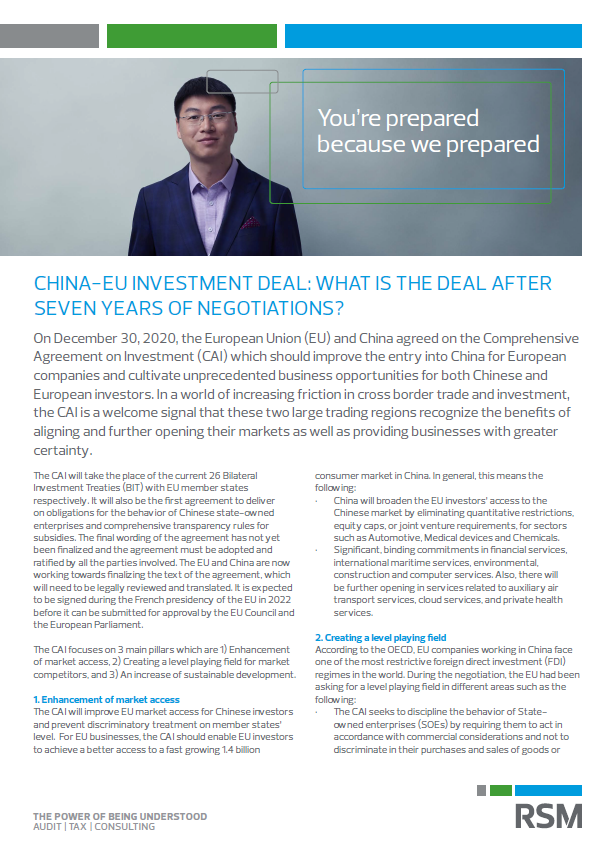On December 30, 2020, the European Union (EU) and China agreed on the Comprehensive Agreement on Investment (CAI) which should improve the entry into China for European companies and cultivate unprecedented business opportunities for both Chinese and European investors. In a world of increasing friction in cross border trade and investment, the CAI is a welcome signal that these two large trading regions recognize the benefits of aligning and further opening their markets as well as providing businesses with greater certainty.
The CAI will take the place of the current 26 Bilateral Investment Treaties (BIT) with EU member states respectively. It will also be the first agreement to deliver on obligations for the behavior of Chinese state-owned enterprises and comprehensive transparency rules for subsidies. The final wording of the agreement has not yet been finalized and the agreement must be adopted and ratified by all the parties involved. The EU and China are now working towards finalizing the text of the agreement, which will need to be legally reviewed and translated. It is expected to be signed during the French presidency of the EU in 2022 before it can be submitted for approval by the EU Council and the European Parliament.
The CAI focuses on 3 main pillars which are 1) Enhancement of market access, 2) Creating a level playing field for market competitors, and 3) An increase of sustainable development.
1. Enhancement of market access
The CAI will improve EU market access for Chinese investors and prevent discriminatory treatment on member states’ level. For EU businesses, the CAI should enable EU investors to achieve a better access to a fast growing 1.4 billion consumer market in China. In general, this means the following:
- China will broaden the EU investors’ access to the Chinese market by eliminating quantitative restrictions, equity caps, or joint venture requirements, for sectors such as Automotive, Medical devices and Chemicals.
- Significant, binding commitments in financial services, international maritime services, environmental, construction and computer services. Also, there will be further opening in services related to auxiliary air transport services, cloud services, and private health services.
2. Creating a level playing field
According to the OECD, EU companies working in China face one of the most restrictive foreign direct investment (FDI) regimes in the world. During the negotiation, the EU had been asking for a level playing field in different areas such as the following:
- The CAI seeks to discipline the behavior of State-owned enterprises (SOEs) by requiring them to act in accordance with commercial considerations and not to discriminate in their purchases and sales of goods or services. Dispute resolution might be a way to enforce this agreement. China shall also undertake the obligation to provide, upon request, specific information to allow for the assessment of whether the behavior of a specific enterprise complies with the agreed CAI obligations. If any of the problems arising go unresolved, China and the EU could resort to dispute resolution under the CAI.
- China will publish the conditions for subsidies and engage in consultations to provide additional information on subsidies that could have a negative effect on the investment interests of the EU.
- The CAI lays very clear rules against the forced transfer of technology, prohibition of any state interference into the licensing of technology. It also should enhance the protection of Intellectual Property sensitive business information and trade secrets in the administrative processes.
3. Sustainable development
Sustainability will focus on labor right protection and environment protection. China has agreed not to lower the standards of protection to attract investment. China also commits to working towards the ratification of the outstanding ILO (International Labour Organization) Conventions and takes specific commitments in relation to the two ILO fundamental Conventions on forced labour that it has not ratified yet. Both EU and China will effectively implement the Paris Agreement on climate change. Also, non-compliance is enforceable via dispute settlement.
RSM observations
With the legal certainty provided by the CAI, Chinese enterprises can make full use of their strengths and expand more in the European market in the field that they are good at, for example, high-speed rail, home appliances, solar panels, 5G, etc., without being restrained by some local restrictions (for example, by EU anti-dumping investigation and increasing tariffs). The CAI should further accelerate the development of E-commerce in Europe, so more and more Chinese enterprises will come to the EU and share the E-commerce market.
For EU companies, apart from the significantly improved market access conditions for EU companies in China, one interesting issue is that many EU companies have established their Chinese operations via Hong Kong SAR or Singaporean holding entities. It is likely that such entities will not be entitled to reap the benefits of increased market access to EU companies. This may also lead to some EU companies needing to restructure their China business.
Next steps
The CAI is an ambitious investment agreement which will have a far-reaching impact on worldwide politics and economics. Although there are still two years before it will start to have an effect, we suggest you could start to consider the possible influence of CAI on your business sector and maybe take it into consideration when making mid-term business strategy plan.
We will keep you updated in this regard. If you want to know further details of this topic and the potential impact to your business, please feel free to contact your trusted RSM advisor.
Download the newsletter 'China-EU investment deal: what is the deal after seven years of negotiations?' in pdf.

